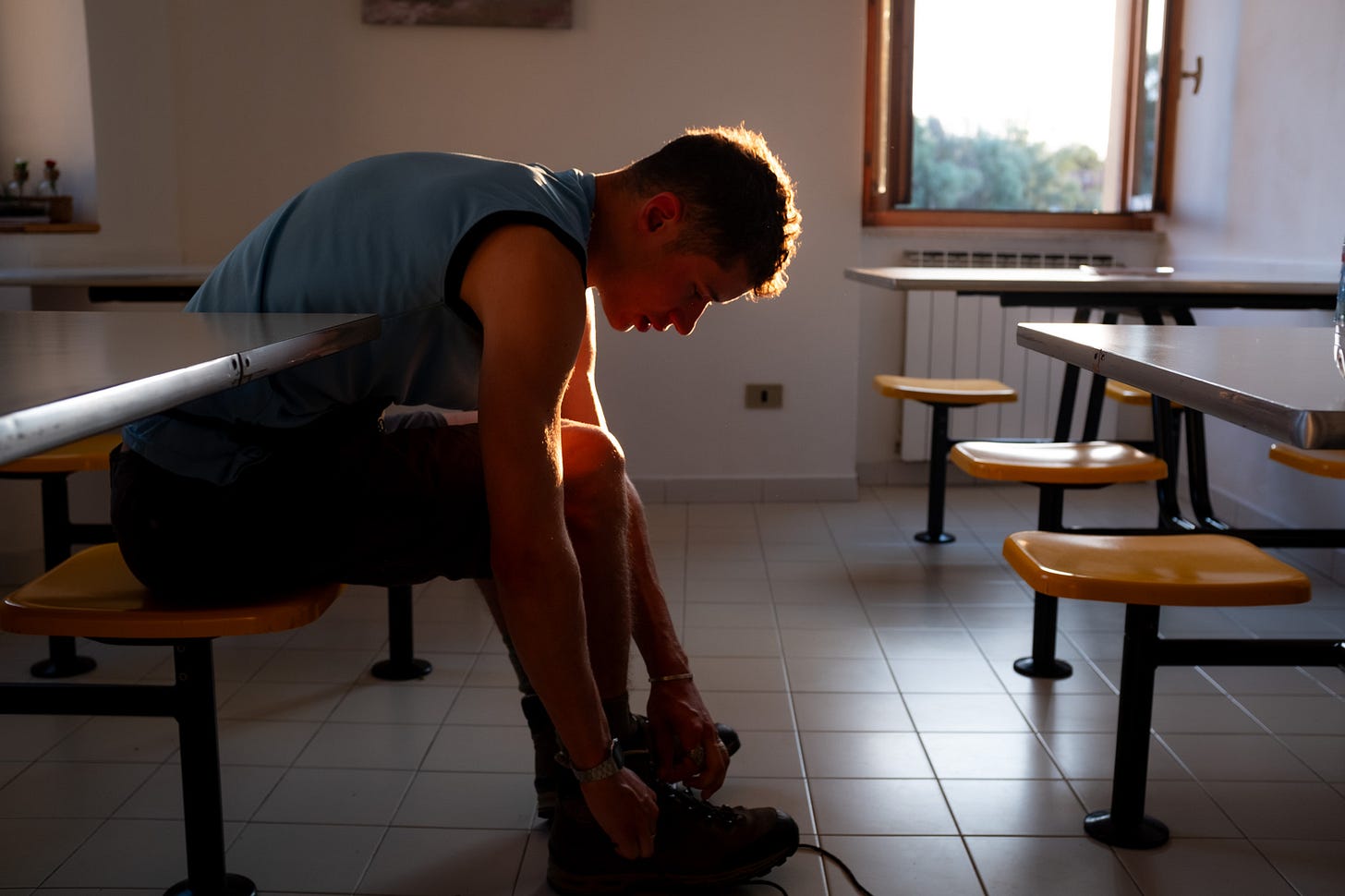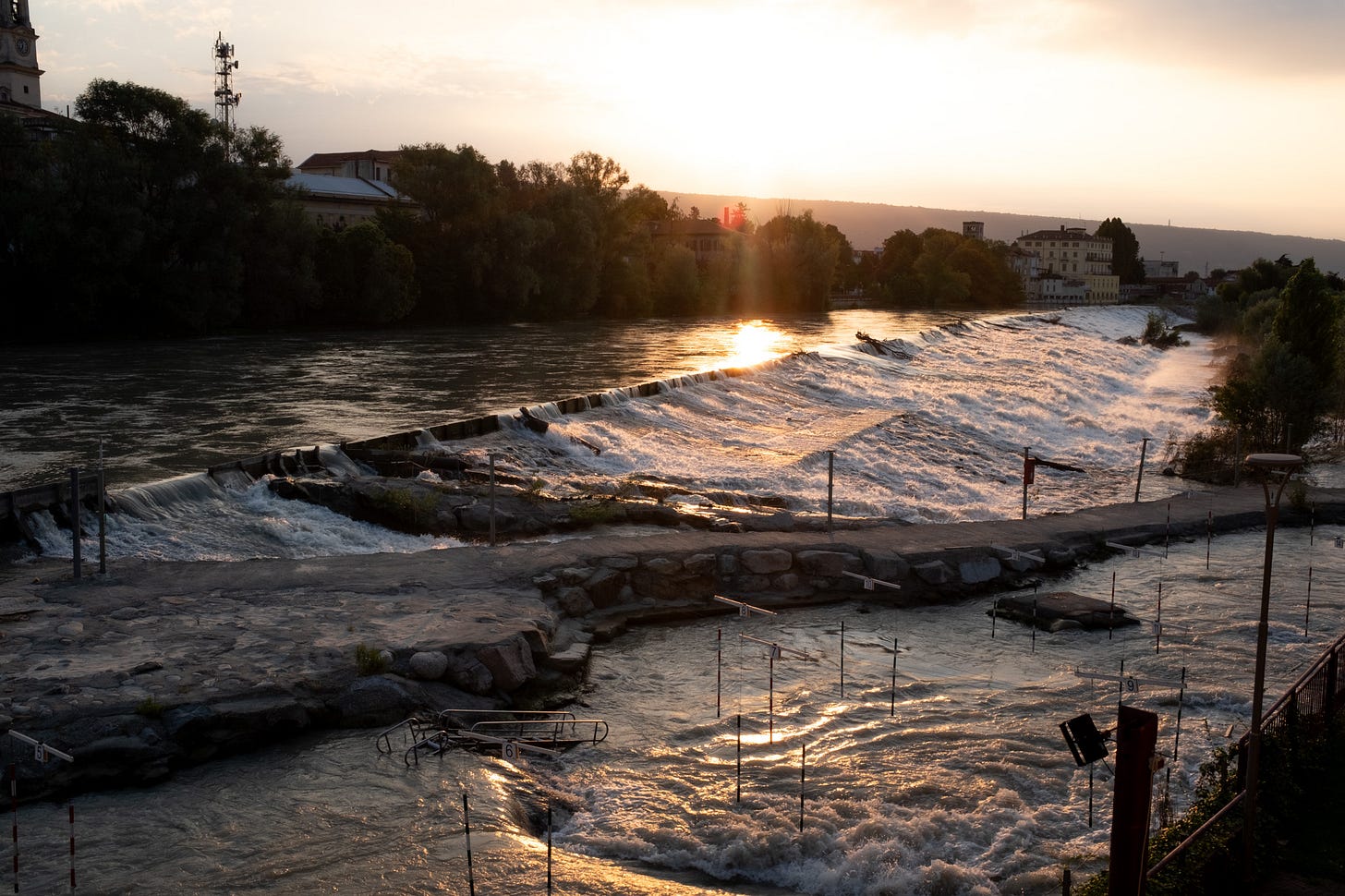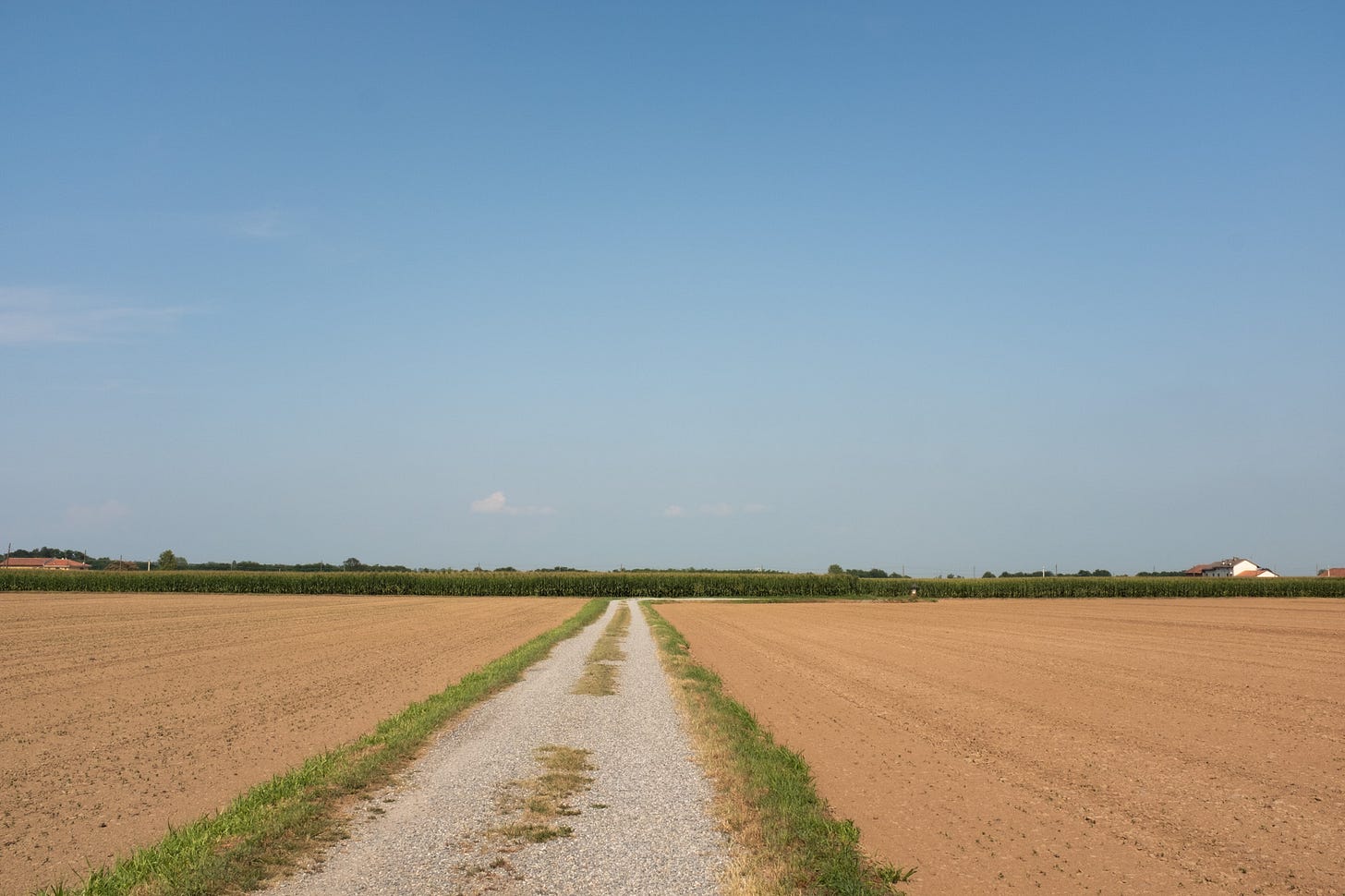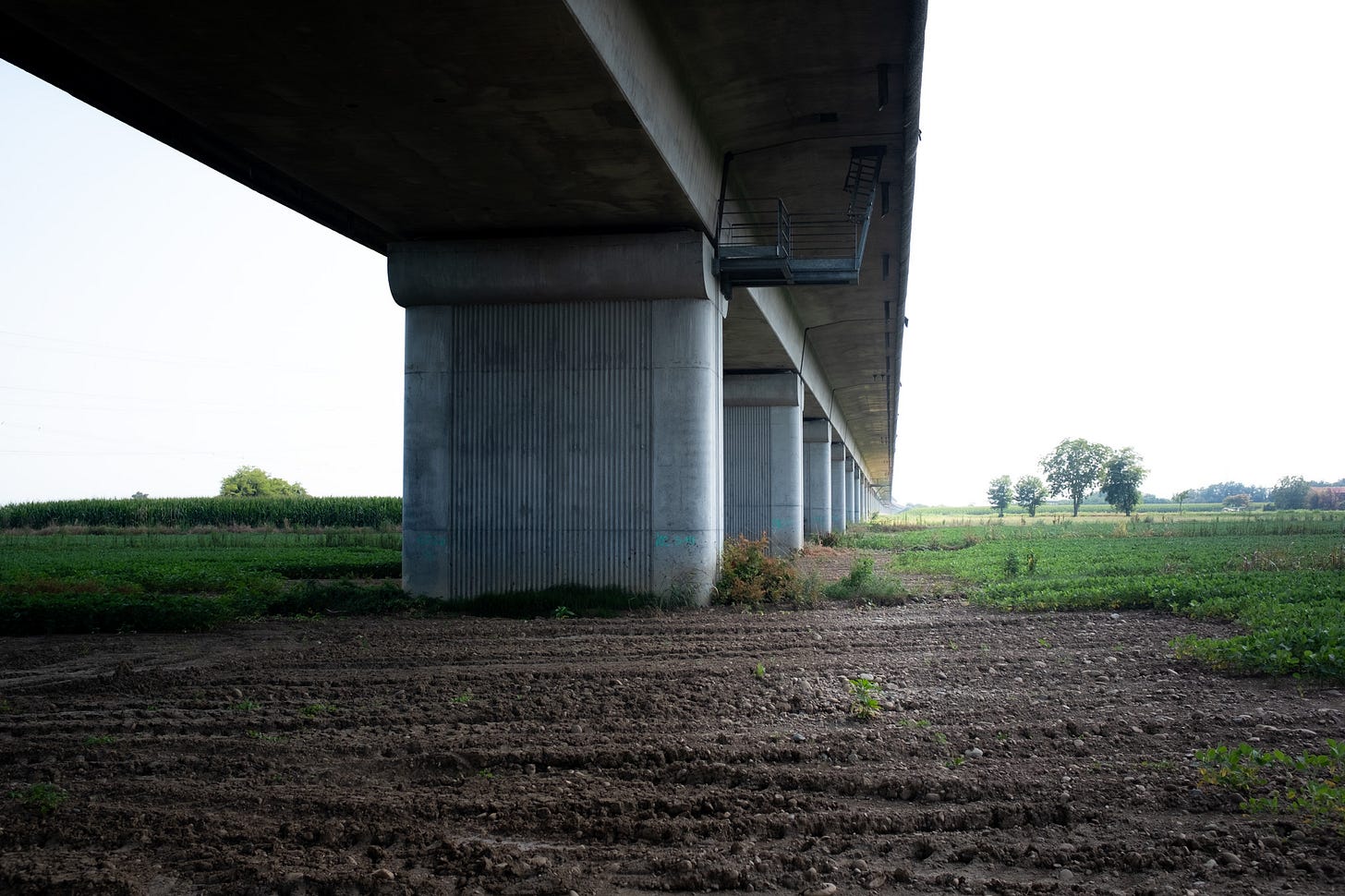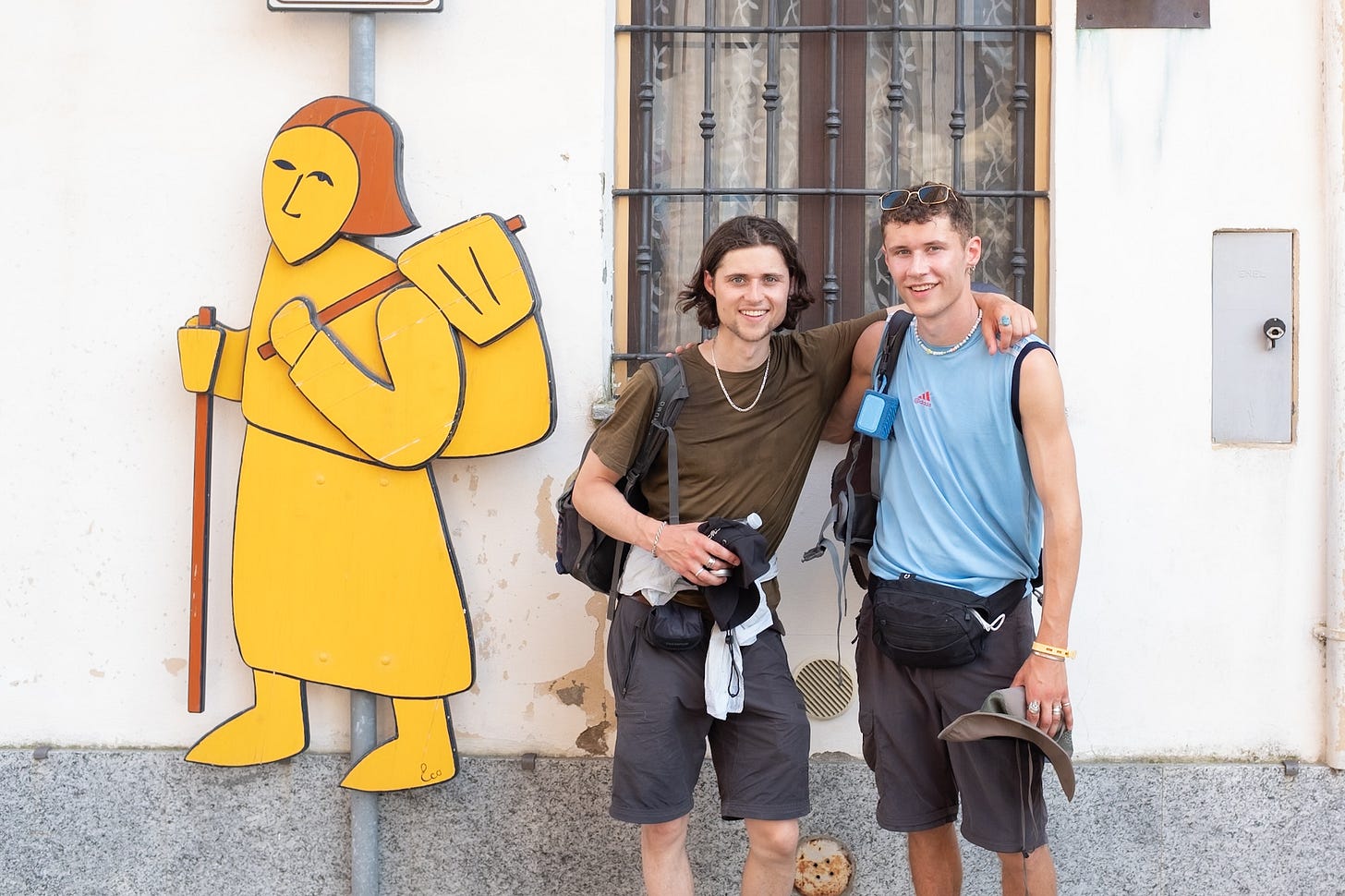I didn’t get his name, it seemed a little early for that. My brother and I were flapping about the hostel’s tiny kitchen, microwaving pasta from the night before, in a rush to leave. He was making coffee on the stove. Through the open shutters roared a vast weir, a mass of white foam that tumbled down a ramp 100 meters wide at least. In the light of breaking dawn, it looked like a view from a plane window, across pink clouds at sunrise.
The Bialetti gurgled. The man turned off the stove and poured two cups.
“Are you here to paddle?” He asked. I pulled our pasta from the microwave. An unconventional breakfast, I admitted, before answering that we were not. We were walking.
“Ahh,” he nodded and looked out across the river. His accent suggested he was from Oceania. Tasmania I soon learned. They were here to paddle.
As it transpired, Ivrea, where we were, was one of the best kayaking places in the world. It made sense, I supposed, with the weir and all. The river beneath the hostel was empty now, it was too early, but the previous evening it had been bobbing with red helmets and lifejackets, fiercely battling the rapids.
A blonde lady, his wife, came into the kitchen. He handed her the spare coffee and they told me the world championships had been here last year. And the year before. In fact, their son had competed both times so they had become familiar with Ivrea, the Dora Baltea River and the Ostello del Canoa - the hostel we were in.
Their son had finished in the top 20 both times I learned.
“Will he be in the Olympics?” I asked.
“Nahh he doesn’t really want it,” was the reply, “It’s a very different thing the Olympics. It’s much more…” he screwed his face up a little, “much more political really. You got to suck up to the right people, and he doesn’t want any of that.”
To have any chance of being in the Olympic team you needed to live in Perth, which isn’t necessarily where you’d want to live, especially if you were from Tasmania. What’s more, the rivers are fake in the Olympics. Millions of gallons of water are pumped around so that everything is even for every contestant. He screwed up his face again. “My son likes real rivers.”
I was interested in this gossip about the Olympics. The Paris Games were due to start in a few weeks so it was topical. “The Olympics thing skews the whole sport,” I was told, “You know, the sudden injection of millions of pounds suddenly shifts the power to the Olympic committee, which isn’t necessarily a good thing.” Grassroots turns to top-down funding, the once devolved power gets hoovered upwards. It’s an old story.
“You see it a lot with surfing out in Oz. Half the surfers now are in the gym doing aero, never had that before. It used to be the Surfers Save Lives community, a nice community that. Good competitions, competitive but not overly. Then the Olympics came in and regulated it too hard. It’s less for the love of the sport.”
The couple weren’t staying long in Ivrea this time. They’d picked up their kayaks just north of Venice and they were driving a rental car to Spain for a competition. It was unclear why. “We wouldn’t have driven 1600 miles by choice but the kayaks were there and the race was there.” The Ostello del Canoa made a natural staging post.
Pasta finished, coffees drunk, we said goodbye. Thomas and I set off out of town, we had a long way to go ourselves, waving goodbye to the two men who’d been in our dorm the night before. They’d cycled from Canterbury and would be in Rome in a few days. Ivrea seemed to be a hinge point for people on long journeys.
We reached Viverone for lunch. A lady in a cafe refilled our water bottles three times and watched us pour them into our parched throats. She offered us a lift to Santhia, taking pity on us. As a hitchhiker, I was tempted by the thought of an easy ride, but my brother wanted to walk every step of the way.
A few miles further we entered the Po Valley. The heat seemed to fall out of the sky on top of us, leaning its weight meanly. The road became straight, tracking the edges of tall fields of corn which hemmed us into their narrow lanes. Every few hundred yards there were head-height poles with what looked like beekeeping hats on, nets tucked underneath. Inside were hundreds of shiny silver beetles. Those still alive clung to the netting which was pulled tight by the mass of hundreds of others.
This was farming territory, vast industrial farming territory. The Po Valley is one of Europe’s largest agricultural regions, stretching from west of where we were right to the east coast. The river itself, which Virgil called the ‘King of Rivers’ is slowly drying up and the pollution that clogs the stagnant air above is some of the worst in Europe. Thomas had two weeks of this before the hills of Emilia-Romagna. I wasn’t jealous.
We reached Santhia exhausted. We’d walked 40km, in the heat as well. Santhia was near the autostrada to Milan and I was going home, my week’s walking over, so it was a good place to end. I could thumb my way to the airport. I hoped at least.
The next morning we said goodbye and I watched as Thomas continued on his way, up the cobbled high street, onwards onto the plane and onwards to Rome. With a large paper bag of his excess luggage, I walked in the opposite direction, to the A4.
I waited, Milano on my sign, in the shadow of two huge grain silos. Lorries turned in and lined up beneath the spouts, then there’d be a huge hiss and clouds of dust as their empty wagons were filled.
I wasn’t overly hopeful of my chances. My efforts in the Autogrill Pero Norde a week before had tempered my expectations, but I gave myself a few hours to try. With nothing by the silos, I tried closer to the slip road. The autostrada skimmed above the plane in a long, diminishing line, held in the pale blue sky by hunks of concrete. It made very little noise.
Nothing happened as I waited. Cars passed but none looked even close to stopping. I watched the time slip away and felt dizzy at points. After a couple of hours, I realised it was no good. I had a flight to catch after all.
With my paper bag in my arms, crumbling from sweat, I struck back up the road to the town and the station. The train was cool and soothing and only a few minutes late. It took off at some speed and glided effortlessly across the flat. After moving no faster than walking pace, going no further than you could in a day, the speed and the ease were a reminder of the wonders of the modern world.
I looked out across the tree-less fields and spotted my brother, marching through the heat. On his way to Rome.
The same journey is mentioned in this article in the Independent. My thanks to Tom Campbell for the write up. https://www.independent.co.uk/travel/news-and-advice/hitchhiking-italy-europe-guide-uk-b2647727.html
Me (left) Thomas (right)




